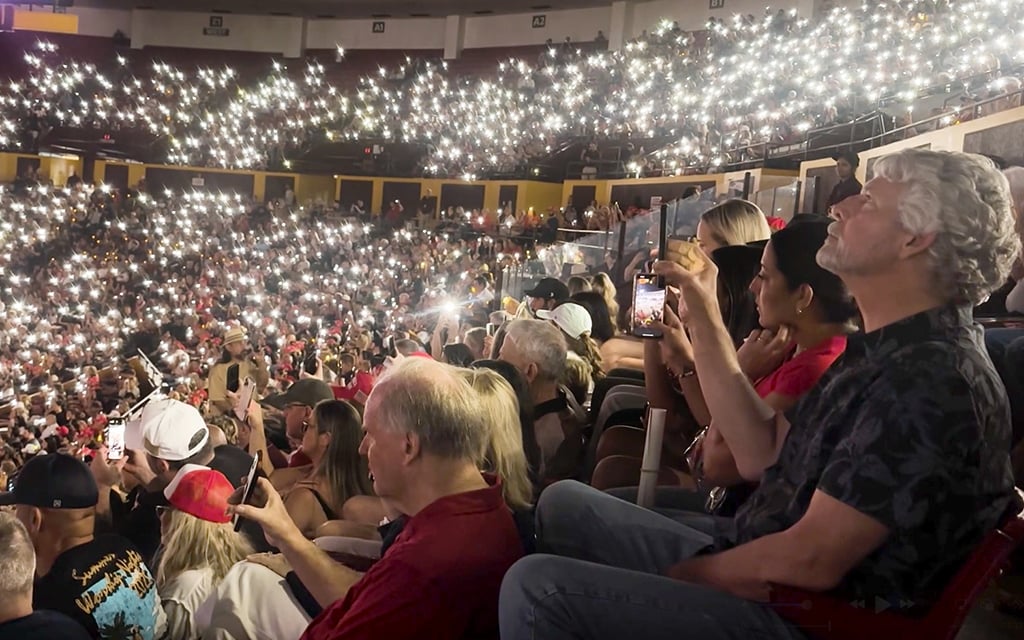Grief over Charlie Kirk is natural, experts say, even for those who never met him


People shine their phone lights during a vigil for Charlie Kirk inside the Desert Financial Arena in Tempe on Sept. 15, 2025. Kirk was shot and killed on Sept. 10 during a Utah Valley University event. (Photo by Kennedi Humble/Cronkite News)
WASHINGTON – Shortly after the start of the two-hour vigil for Charlie Kirk at Desert Financial Arena in Tempe on Monday night, one of the speakers asked the packed house a question.
“If Charlie Kirk had an impact on your life, can we hear you please,” said Troy Holderby, president of the College Republicans chapter at Arizona State University.
The crowd erupted. Thousands rose to their feet, cheering a man who most had never met. The ovation lasted a full minute.
“Charlie impacted us all,” Holderby said as the cheers died down.
Experts who study relationships between public figures and fans who’ve never actually spoken with them – referred to as parasocial – say the bonds can run deep. And if a public figure dies, the response can be as gut-wrenching as a death in the family.
“There’s a real, genuine grief and mourning that goes on,” said Lynn Zubernis, an expert on fan psychology whose books include one on extreme fandom titled “Fangasm: Supernatural Fangirls.”
Kirk, 31, was a rising star in conservative political activism. At 18, he co-founded Turning Point USA. The influential group now has chapters on hundreds of college campuses and helped President Donald Trump win last year.
Kirk frequently spoke at university rallies, offering controversial stances on women’s rights and gun laws. He starred in viral videos in which he debated people with opposing political views.
Last Wednesday, a gunman shot and killed him during an appearance at Utah Valley University.
“We always would send his videos. I have a family group chat with my two little brothers who are both in college and we’d always just send them … and pretty much just praise what he was doing,” said Phoenix resident Hannah Carson. “They were very devastated when they found out.”
Carson came to the Tempe vigil wearing a T-shirt with the iconic image of Trump moments after a bullet grazed his ear, fist raised in defiance after an assassination attempt during a July 2024 campaign rally.
Kirk was a common topic of conversation in her family, Carson said, and like most of the mourners, she’d never met him.
“Make America Great Again” hats and American flags dotted the crowd, and the atmosphere was somber when the lights dimmed and Kirk’s fans turned on their phone flashlights.
“I liked his message. I’m Christian, so I am biased towards what he spoke for. But outside of that, I liked his policies,” said Mac Brunk, a 21-year-old ASU student, the admiration coating his words. “I thought he was a great man. He was a good husband. … That’s really what drew me to him.”
Not having met Kirk doesn’t make the grief any less real for his fans, psychologists say.
“A parasocial relationship is a real relationship, but it is a nonreciprocal relationship,” said Zubernis, the fan psychology expert.
According to Zubernis, a professor of counselor education at West Chester University near Philadelphia, fans can develop parasocial relationships with celebrities, professional athletes and political leaders – someone “they feel an attachment to because they like what the person stands for.”
Such relationships develop out of “para-communication” between the admired and admirer.
“Think of it as a dialogue, and my half of the conversation is in my imagination, because I don’t really know this person. Their half of the conversation is through the media and their mediated messages,” said Gayle Stever, a psychology professor who co-authored a 2024 book titled “Parasocial Experiences: Psychological Theory and Application” and has studied the phenomenon for nearly four decades.
“They’re telling me what they want me to know about them through their YouTube video, through that talk show interview, through their work. They’re playing roles on TV … and I’m responding to it, because my brain is hardwired to respond to other people in a certain way,” said Stever, an ASU graduate who teaches at Empire State University in upstate New York.
This deep, one-sided connection to the public figure is also known as “parasocial attachment” – and it can provide “comfort and … a sense of safety and solace and stress reduction,” Stever said.
The outpouring of sadness over Kirk’s death has been on full display at vigils and in the comments on a tribute post published to his Instagram account.
One user invoked the hashtag “prophetcharliekirk.” Another wrote, “RIP HERO.”
“He lives in all of us,” posted another. “Charlie Kirk (1993-infinity).”
Outsiders may perceive the intense reactions as excessive. There may even be some stigma that makes it harder for those in mourning to process the loss of an influencer they idolized.
“People feel like they can’t reach out to maybe their usual support systems,” said Stever, because instead of offering comfort, “it’s going to be ‘You’ve never even met the guy. Why are you acting this way?’”
With reporting from Ryan Myers and Kennedi Humble in Tempe.